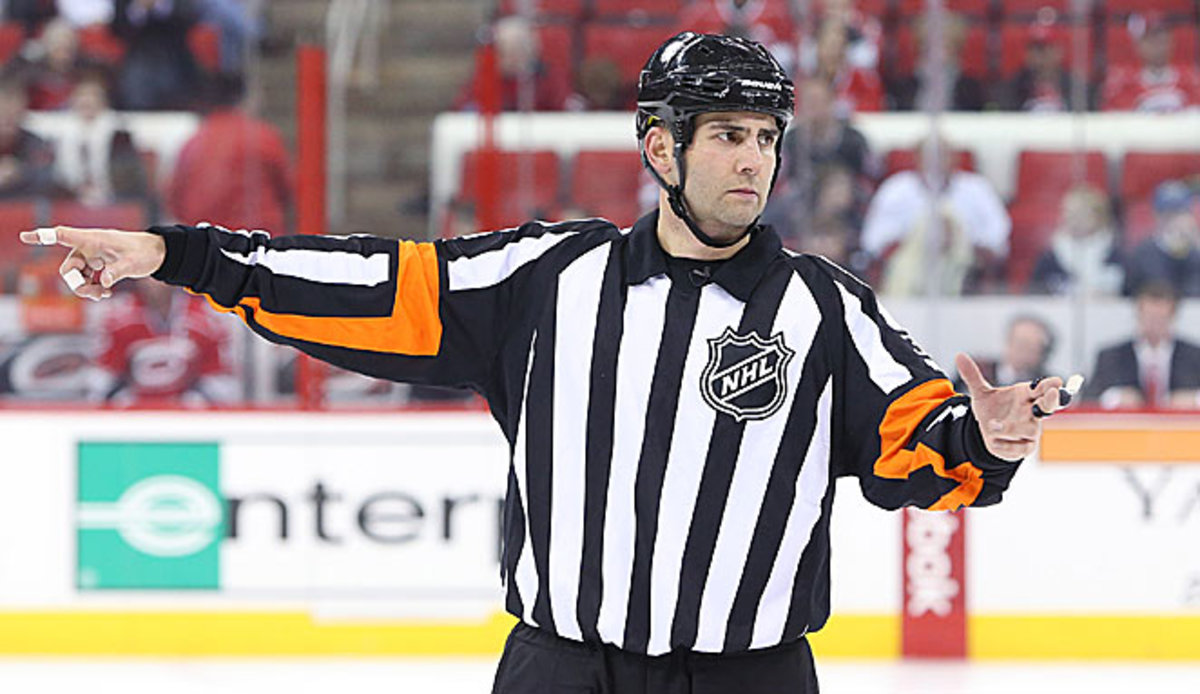Rusty referees keeping special teams busy

As their whistles try to set a tone, NHL officials are still getting up to speed after the long lockout.
Andy Mead/Icon SMI
Nearly a week into this new season, the cobwebs are beginning to clear around the league, and hockey is starting to look as it should. It's still far too early to make much of it in terms of league-wide trends, but one notable thing that stood out during the first week was the frequency of whistles.
Through the first 48 games, the league was averaging a little more than 15 penalty minutes and more than nine power play opportunities per game. That's four more minutes and nearly three more opportunities than last season, taken as a whole. In Thursday night's game between the Oilers and Kings, the teams just seemed to be trading power play time. For nearly half the game (close to 29 minutes), either club had a man advantage.
"Early in the year, you always get a high standard," Devils coach Pete DeBoer says of the officials. "They're trying to get back and make sure everyone understands where the standard lies."
It's true that the league normally sees a bump in calls early in the season. With the shortened training camp and no preseason games this year, that trend was likely exacerbated in the opening week, as players reacquainted themselves with the NHL's standard of officiating. And referees, too, didn't have much time to get back up to speed.
MUIR: Coaches see value in fights
"I think the referees are really trying to get a good feel... and trying to adjust the best way they can," says Bruins coach Claude Julien. "Right now, you got a little bit of a difference here and there, and this is where we as coaches and players, we have to understand that part of it too. They've been off for a while. Why wouldn't they be a little rusty if we are as teams and as players? ... I think eventually you'll find that common ground where everybody's going to basically call it the same."
At the end of last season, though, there were calls to reexamine obstruction on the ice. In 2011-12, there were 445 fewer restraining penalties (hooking, holding, tripping, interference, and holding the stick) called than the previous year. Last May, GMs discussed what some saw as slipping standards back, and it was a topic at a rules enforcement summit held in August.
In the early days of this season, the number of restraining penalties called has risen. In 2011-12, they accounted for 49 percent of minors, and so far that percentage is at about 51.7 percent. It's difficult to say this early in the season if the standard has demonstrably changed. After all, the increase could also be explained by players not being in game shape, and using shortcuts like hooking and holding to keep up with the play. But given the league's desire to get back to entertaining, goal-heavy hockey as quickly as possible, I wouldn't expect the whistles to go away soon. And why should they? Nobody wants to take a turn back to the Dead Puck Era.
The extra power play time so far this year has been a boon for scoring, though. On the first day of the season, a Saturday, power play goals made up 44.6 percent of scoring league-wide. By Friday, the percentage had dropped to about 35.2 percent, but still, considering power play tallies usually make up about 20 to 25 percent of goals scored, the figure is high. Through the first 48 games of last season, it was nearly 10 points lower, at 25.9 percent.
When asked about the anomaly, players seemed surprised.
"Honestly, I would've guessed the opposite just because it's easier to play defense," Bruins defenseman Andrew Ference said. "Especially coming off a lockout, there's usually sloppier play offensively with the puck and moving the puck well and finding your linemates. I would've guessed it would be harder for a power play to click along at a really good pace. Penalty killing and defensive units, positioning yourself on the ice, I think, comes a lot easier just to jump back into it."
Ference's teammate, Milan Lucic, however, wouldn't totally agree. "The details of your defensive zone, especially on the PK, where you stand, it takes a little time to get used to that," he said. "I think a lot of teams put more emphasis on practicing the power play than the penalty kill, so that might have a little bit to do with it too."
In a shortened camp, the power play is something teams can actually practice, and defensive lapses on the penalty kill are particularly easy to take advantage of.
"At the end of the day, five-on-five, 80 percent of the teams are the same," says Devils goalie Martin Brodeur. "Where it differs is your special teams.... Especially in the shortened [season], adjusting to different teams so quickly, special teams are going to be really, really important."
There's no way the league will maintain this pace of power play goals. As Julien says, eventually, everybody finds common ground and all the anomalies will be pulled back into the mean. But for the time being, scoring is up, and that's brought entertainment value back to the game. There were no worries; the puck was alive.
































